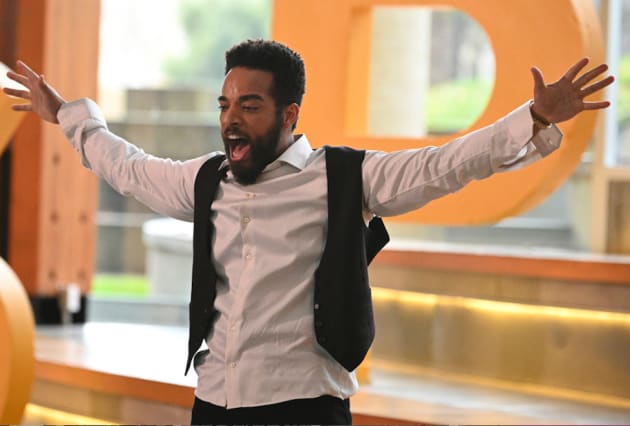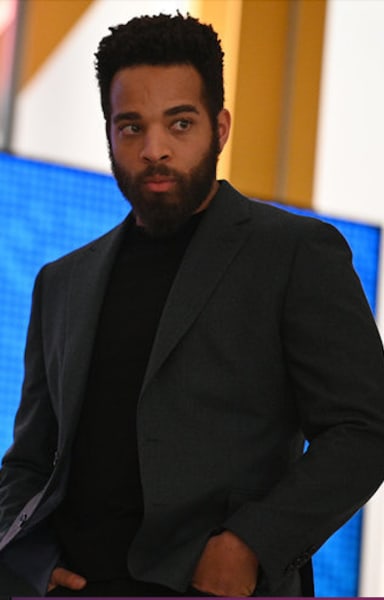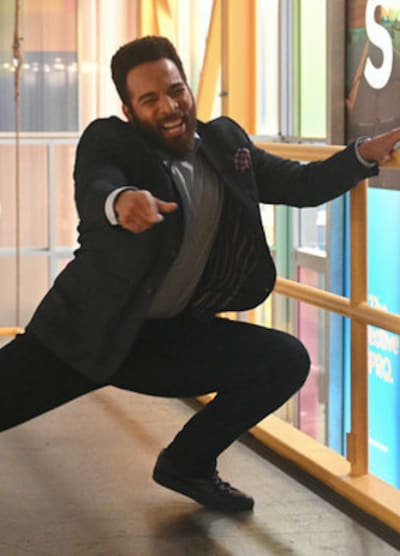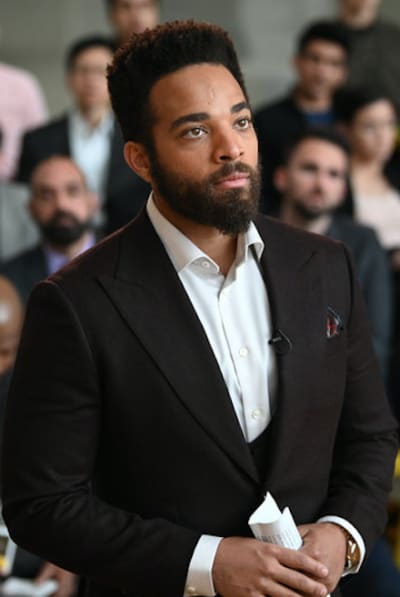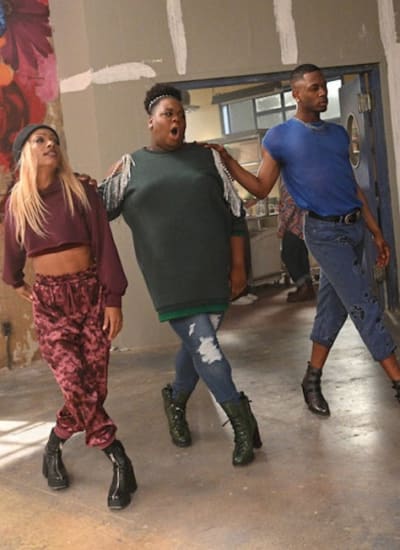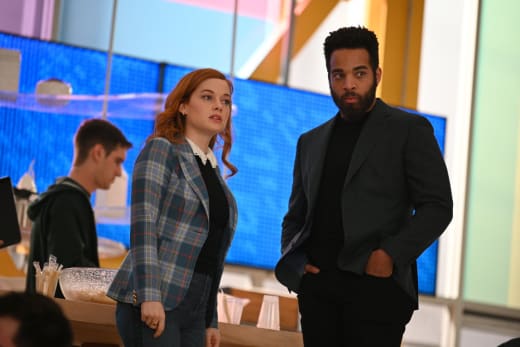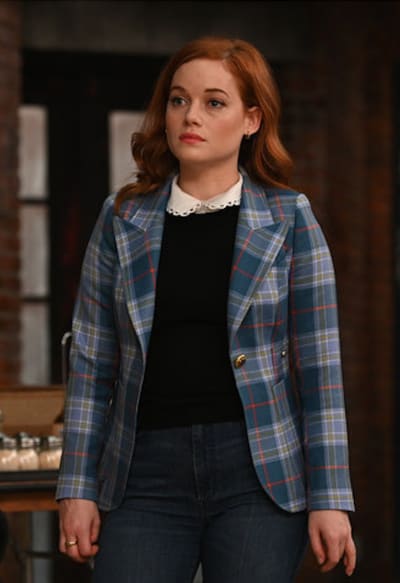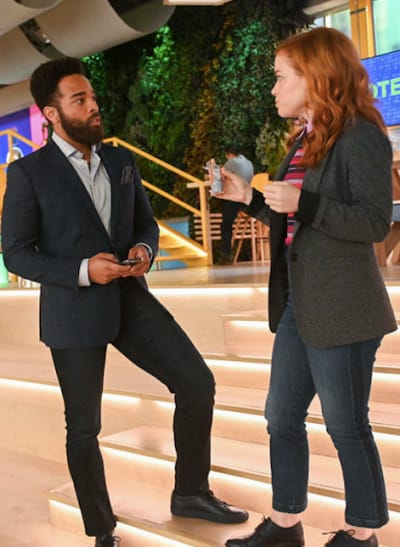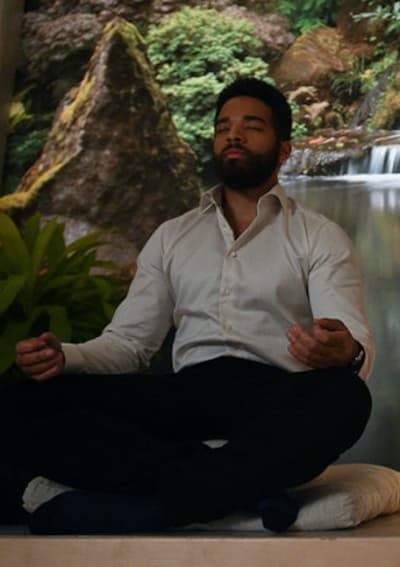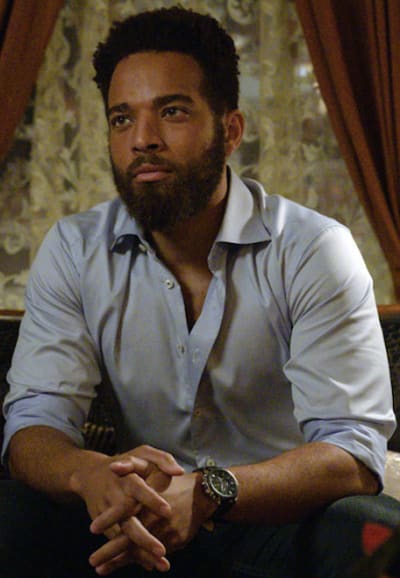John Clarence Stewart stars as Simon on Zoey’s Extraordinary Playlist.
We had a chance to talk with him following Zoey’s Extraordinary Playlist Season 2 Episode 6.
Read on to find out what John had to say about how this pivotal episode came together, his reaction to the final product, and what’s next for Simon.
Talk to me about how this whole plotline came together.
I heard about this back in like June, July, as the writers’ room was getting kicked off. And [story editor] Zora [Bikangaga] would say what they were going to talk about the season, which at the time was like, three, four weeks after George Floyd was killed.
I was in the throes of processing a lot, as everybody else, specifically, the writers in the writers’ room. This came up, and [creator] Austin [Winberg] reached out to me and said, ‘This is what we’re thinking.’
And I told them what my reservations were as far as approaching the subject matter on the show and wanted to make sure that I’m a part of the process because I want to make sure that we’re doing it right, in a way that gives me peace, because, you know, it’s my face and my name on it. He obliged, and I had a conversation.
He connected myself and Zora, who wrote the episode, and we had a few conversations that began when I came up to quarantine in Vancouver in late August. We talked about being Black men in the world and the workplace, specific experiences. Some of those found their way into the script.
Zora also talked to Alex Newell and Kapil Talwalkar about their own experiences in the world in an effort to get as specific as possible. The concern that I had that was shared by a lot of my fellow cast members was that the characters would not be specific, that they’d be used as the plot devices.
And it would be at the end of the day; we have a white savior in Zoey. We’d get like a nice capsule systemic racism episode with a … chaser of joy at the end, and it’s like, uh, we didn’t want to do that. So Austin was really instrumental in making sure that didn’t happen, and fortunately, we did not have that.
Choreographer Mandy Moore early on thought about the language, the physical language of the episode, and wanted to make sure that everything was in line physically with that same level of specificity toward the Black experience and reached out to Luther Brown, a collaborator and friend of hers for a long time.
He came in and just did just an incredible job, bringing this physical language to the episode that I think is pretty singular. And lastly, it was the decision of Austin and Zora in the writers’ room to make sure that we had only Black musical artists that we use in the episode.
I think that was also very instrumental and making sure that we once again are in line with this specificity that we wanted to capture so deeply.
At the end of the episode, the characters celebrate a small victory. Do you know if some of this plot will continue throughout the season because there’s still so much more work to do? I’d personally love to see more, as this is such an important story to tell.
You know, what that makes me happy to hear. As far as I know, you will be seeing more of this storyline. Specifically for me, it all comes down to the specifics. Not only will you get to see parts of the storyline, but you’ll get to see how they’re specifically trying to take each step forward, which I think is very important.
Artificial intelligence, there’s a whole lot of things going on. There’s an entire movement going on right now about ethics and AI having to do with racial bias and algorithms. And not only that on a micro-specific level, but just systemic racism in general in every workplace.
So we haven’t got a silver bullet, but we are going to keep it as part of the texture and the story of the show moving forward, which I think it’s very responsible. I think that’s just I think that’s responsible storytelling to do so.
So how was filming this past episode? It’s something so important, so you want to make sure you get it right.
It was an intense amount of pressure, and I think everyone felt it. I felt it back in June, July, when I was told that this would be an assignment we’ll be doing that we’ll be addressing systemic racism in the workplace at SPRQPoint, and I thought, ‘Oh snap.’
I already felt a certain degree of pressure because we’ve seen stories be told before about the Black experience, about the brown experience. And we’ve seen those stories be told in a way that doesn’t take a conversation a step forward; it that takes us five steps back, that causes wounds and hurts people.
And I didn’t want to inflict further trauma on the Black and brown community, given everything we’ve lived through. So that was something I was living with very presently throughout the process, coming up to shooting and through shooting. Not only that, but we’re all in a space that is predominantly not Black on our set.
Fortunately, there was an intentionality where Black people were brought into the space, as we saw at the end of the episode, all of the Black and brown bodies celebrating within that space, which was, you know, akin to a spiritual experience on set.
And we also have Anya Adams, our director, a Black woman, and Zora Bikangaga, our writer, a Black man, who came up as we were shooting the episode, which was really, really helpful. Still, to shoot some of those scenes was right on trigger points for me.
The scene between Zoey and I, where she whitewashes my humanity and calls me Simon, devoid of my blackness, is a conversation I’ve had with many white friends of mine who I love and care about, some of whom, when George Ford was killed, reached out to me, and were talking to me as we were both spectators watching the world burn.
As opposed to reaching out to me like a Black man who was affected by the state of the world and everything that was happening, so something’s very, very close, and it was labor. But it was if the labor that we choose — the labor that I chose. I think labor is the best term for it because there’s the pain.
And I think that’s the thing, that there’s labor to the birthing of this story in this very specific and intentional way, which brought up a lot of dissonance, laid on a lot of triggering places for everyone involved.
But fortunately, everyone’s willing to have the conversations necessary and to show up day in and day out in order to tell the story. And we’re left with a product and a story that is specific, that is true to the Black and Brown experience. And we see that, I think, in the way it’s been received, and that makes me most happy.
Did you have to have any tough conversations with people on set?
Oh, yeah. I mean, I had to have tough conversations. Zora and I had tough conversations about themes and like, what we were trying to get in, concerns that we had about whether or not a white character like either Zoey or Danny Michael Davis was going to be softened too much, wanting to make sure that made the mistakes.
The thing that was so important to me personally was that we show process. Like, I think we’re so afraid of process, no one wants to own that they don’t know and that they have to learn. And learning is not like I sit by myself and watch a bunch of Instagram videos.
The learning is, you know, how do I show up in the world when I have this little information? How do I, in a flawed manner, try and fail to show up in the best way that I’m allowed? I think we see that with Zoey.
One of the things I had to navigate — I think we all had to navigate this — was the scene between Zoey and myself with Zora and Anya on set that day because we haven’t quite cracked it.
It took some time and exploring on behalf of Jane [Levy] and myself and Zora and Anya to find what it was that Zoey says that triggers Simon to the place where he feels the need to say what he says to her.
And we finally got to the space … where Zoey, in an effort to connect with Simon’s struggle, brings the best thing that she has to the table, which is being a woman in the workplace. It’s an experience that I’ve had with white friends, with white friends who are women as well.
And in also my view, it’s also an experience that I’ve had as a Black man toward Black women when I talk about the struggle that I have, and they have to inform me and let me know that the struggle is not the same, and I have to go, ‘Got it. I believe you, and I have to have to eat it, own it and do better. ‘
And we get that opportunity through the work on the day with Jane and Zora on set, which is great.
I really loved that scene you’re referring to when Zoey and Simon have the tough conversation. I especially love when Simon talks about having to amputate parts of himself.
That was a specific conversation that Zora and I had on the phone. We were talking to each other, and I was like, you know, this idea of amputating, the amputation itself lingered and has been like a language that circled me for a few years. And Zora and I were talking about it, and he wrote it down, and I’m so happy that it found its way into the script.
Because it’s probably the most potent metaphor I can think of, along with extending it, the idea of what it is to amputate a limb and the phantom pains that happen when a limb is no longer there.
What are your thoughts on the final product?
Okay, so I had two reactions. My first reaction was, ‘Oh my god, I’m terrible.’ But then I took a step back, and I saw what we crafted. I saw the performances of everyone. And I also feel like how Simon fits into the story, the entire framework of what we build, and I was very, very proud.
I mean, there are so many ways we could have been left with something on television to live for eternity that brings shame to all of us. And that wasn’t my experience. I feel incredibly proud.
And the musical numbers that I was able to do, I felt very proud of myself, and of Luther Brown and the choreography and all of the numbers from Alex and Kapil.
Can you tease anything for what’s coming up in the next half of the season for Simon?
You’ll see some more textures and layering in of this stuff, which is, you know, responsible storytelling, I think it’d be really weird if it’s just like, high five, cool, let’s get drinks, and so I think there’s, you’re gonna see some textures of that.
I think you’ll also see what happens in the relationship between Simon and Zoey. Moving forward, there’s a very specific thing that they’ve navigated, and you get to see whether they’re still navigating it, what their friendship looks like, and then if anything else happens.
Is there anything else you’d like to see happen to find in the season?
The things that I like to see happening with Simon are, as things continue, I just want to see specificity with Simon when it comes to work. I’ve talked to Austin, and I’ve seen some of the scripts that have come down the pike.
I think there’s a specificity that is necessary because we happen to be talking about a topic and subject matter that is happening right now.
It’s happening in AI right now … So there’s a responsibility that we have to be as specific as possible, regardless of whether it’s plot A, B, C, or D in the fabric of each episode.
Is there anything else you want to add?
I want to make sure that everybody is thanked: Anya Adams, our incredible director; Zora Bikangaga, our incredible writer; Alex Newell, phenomenal Mo; Kapil Talwalkar, terribly wonderful Tobin. We have Austin Winberg, who steered the ship and brought this to the table, to begin with.
And also props for finding ‘Black Man In A White World.’ Austin’s the one that brought that into the room, and I got to also give up to our entire cast. Because it’s very… we became closer in this process. And I think that I’m just very grateful that we have the people around us that we do.
Zoey’s Extraordinary Playlist Season 2 will return with new episodes on Sunday, Mar. 28, 2021.
Jessica Lerner is a staff writer for TV Fanatic. Follow her on Twitter.
